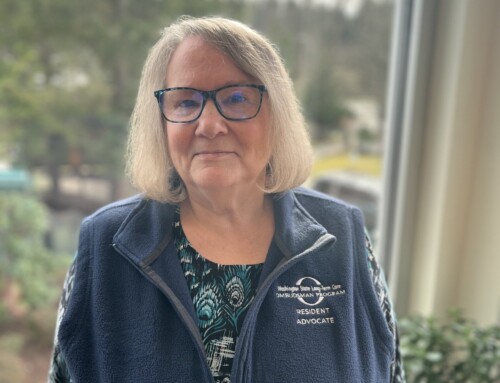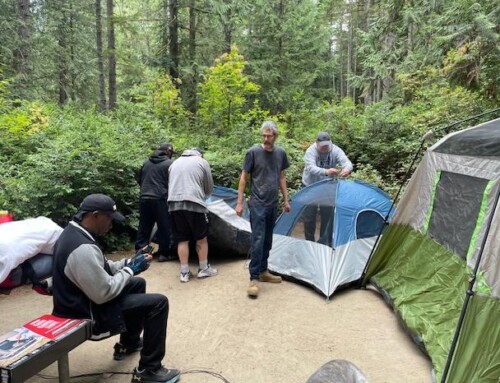At 48 years old, Tracie is younger than most people imagine when they think of someone in a long-term care facility. However, people under age 64 represent about 37 percent of those needing long-term care.*
Two years ago, Tracie suddenly had a stroke after finding her father who had just passed away. She was immediately rushed to a hospital where she remained in a coma-like state for 15 days. Tracie’s husband, then six-year-old son, and her mother struggled to make it through this difficult time as they dealt with both the loss of her father and the unknown of Tracie’s future.
The stroke left Tracie with mobility issues on her left side as well as some memory problems. The 15 days at the hospital left her with pressure wounds on her left leg that still have not yet completely healed. For the last two years, Tracie has lived in a long-term care facility.
Tracie remembers signing a lot of paperwork when she first arrived at the facility, but doesn’t remember what she signed. During her first few weeks at the facility she had her first interaction with the Washington State Long Term Care Ombudsman Program (LTCOP) operated by MSC and learned that she had certain rights granted by federal and state law that the facility could not violate.
At first, Tracie did not want to pursue anything as she was afraid of retaliation from the staff. However, when the facility threatened to move Tracie to a different facility more than 30 miles away for allegedly violating a condition that was in the application paperwork she signed, she had to do something. This move would have reduced Tracie’s contact with her family significantly. Her family visits would not be as frequent due to the commute and Tracie would no longer be able to take day trips to her mom’s on her own in her wheelchair. Being able to see her family is an integral part of Tracie’s recovery.
Lexor Green, King County Long-Term Care Staff Ombuds, stepped in to help Tracie stay at her current facility. Lexor requested an administrative hearing to ensure that Tracie’s rights were protected. The judge ruled that Tracie could remain at her current facility.
“Lexor helped me stay here where I can see my family. She helped me to know how to get my frustrations through the right channels so things can change,” says Tracie. Although there are still many things that frustrate Tracie regarding the facility she lives in, she now has the knowledge to know how to approach these issues thanks to LTCOP.
Tracie hopes that one day she will be able to move back into a place with her husband and son. “The doctors are hopeful. When I got here I didn’t know my name, now I’ve taken ten steps,” reports Tracie. Tracie needs to be with her family and have the opportunity for more physical therapy to continue to heal. The Ombuds will continue to be in her corner with knowledge and advocacy as long as she needs them.
More than 300 LTCOP volunteers and 17 staff throughout Washington State visit nursing homes, assisted living facilities, and adult family homes to make sure that each resident is aware of his or her rights. Ombuds also respond to calls from residents, family members, or anyone concerned about the welfare of vulnerable adult who is living in a nursing home, assisted living facility, or adult family home.
If you or a loved one are living in a long-term care facility and have questions regarding resident rights or would like to make a complaint, please call the hotline at 206.623.0816. You may also find more information online at waombudsman.org.
*Rogers, S., & H. Komisar. Who needs long-term care? Fact Sheet, Long-Term Care Financing Project. Washington, DC: Georgetown University Press, 2003.






